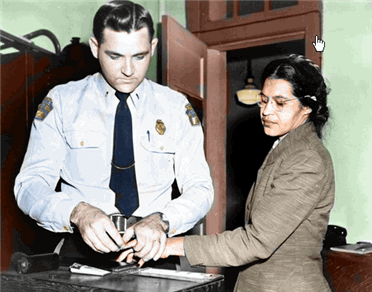Rosa Parks, Civil Rights Pioneer, Dies at 92
Rosa Parks, who fifty years ago set off a revolution by refusing to give up her seat on the bus, died today at the age of 92.
Civil rights icon Rosa Parks dies at 92 (CNN)
Rosa Parks, who helped trigger the civil rights movement in the 1950s, died Monday, her longtime friends told CNN. She was 92.
Parks inspired the civil rights movement when she refused to give up her seat on a bus to a white man in Montgomery, Alabama, in December 1955. Her arrest triggered a 381-day boycott of the bus system by blacks that was organized by a young Baptist preacher, the Rev. Martin Luther King Jr., and led to a court ruling desegregating public transportation in Montgomery.
Parks, a seamstress, facing regular threats and having lost her job, moved from Alabama to Michigan in 1957.
She joined the staff of U.S. Rep. John Conyers, a Michigan Democrat, in 1965, championing civil liberties. Parks later earned the Presidential Medal of Freedom and Congressional Gold Medal.
Civil Rights Pioneer Rosa Parks Dies at 92 (NYT – AP)
Rosa Parks, Civil Rights Icon, Dies at Age 92 (WaPo – AP)
Civil Rights Pioneer Rosa Parks Dies at 92 (AJC – AP)
Rosa Lee Parks, whose refusal to give up her bus seat to a white man sparked the modern civil rights movement, died Monday. She was 92. Mrs. Parks died at her home of natural causes, said Karen Morgan, a spokeswoman for U.S. Rep. John Conyers, D-Mich.
Mrs. Parks was 42 when she committed an act of defiance in 1955 that was to change the course of American history and earn her the title ”mother of the civil rights movement.” At that time, Jim Crow laws in place since the post-Civil War Reconstruction required separation of the races in buses, restaurants and public accommodations throughout the South, while legally sanctioned racial discrimination kept blacks out of many jobs and neighborhoods in the North. The Montgomery, Ala., seamstress, an active member of the local chapter of the National Association for the Advancement of Colored People, was riding on a city bus Dec. 1, 1955, when a white man demanded her seat. Mrs. Parks refused, despite rules requiring blacks to yield their seats to whites. Two black Montgomery women had been arrested earlier that year on the same charge, but Mrs. Parks was jailed. She also was fined $14.
Speaking in 1992, she said history too often maintains ”that my feet were hurting and I didn’t know why I refused to stand up when they told me. But the real reason of my not standing up was I felt that I had a right to be treated as any other passenger. We had endured that kind of treatment for too long.”
Her arrest triggered a 381-day boycott of the bus system organized by a then little-known Baptist minister, the Rev. Martin Luther King Jr., who later earned the Nobel Peace Prize for his work. ”At the time I was arrested I had no idea it would turn into this,” Mrs. Parks said 30 years later. ”It was just a day like any other day. The only thing that made it significant was that the masses of the people joined in.”
The Montgomery bus boycott, which came one year after the U.S. Supreme Court’s landmark declaration that separate schools for blacks and whites were ”inherently unequal,” marked the start of the modern civil rights movement. The movement culminated in the 1964 federal Civil Rights Act, which banned racial discrimination in public accommodations.
The civil rights leaders of today pale in comparison to Parks and her compatriots. I was born a decade after Parks’ act of defiance and went to school, mostly in the South, in schools that had recently desegregated. By that time, the culture had changed sufficiently that the idea of segregated institutions was inconceivable.
Rest in peace.
Related: Rosa Parks an NAACP Pawn?
Update: Great picture:

For larger size, see In Search of Utopia.






i love rose